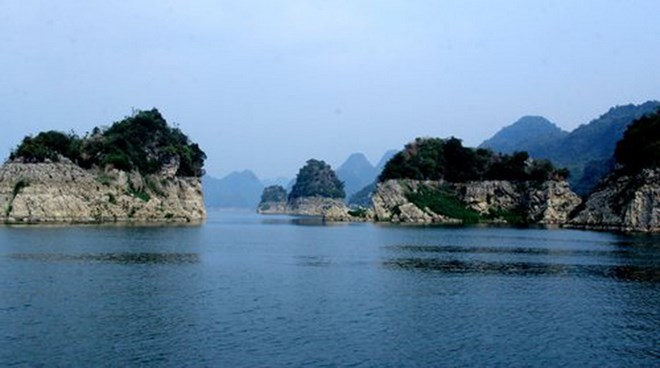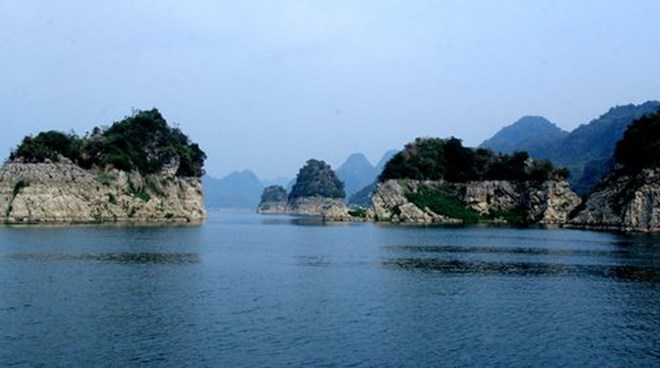
A fact-finding trip was organised to explore potential for tourism development in mountainous Lung Van commune in the northern province of Hoa Binh’s Tan Lac district.
Hoa Binh
Lake - a tourist attration in Hoa Binh
province (Source: VNA)
The trip was joined by local officials,
representatives from Action on Poverty in Vietnam, and FLC Group on August 8.
Situated at an altitude of nearly 700m above sea level, and covered with clouds
around the year, Lung Van is the centre of five upland communes of Tan Lac
district. It has great potential and advantages for promoting tourism
development.
It boasts numerous heritage featuring Muong ethnic people’s culture identities
such as Mo Muong culture heritage, Muong gong, handicraft products, traditional
festivals and folk games.
Lung Van is an attractive destination for community-based tours. It has the
provincial road 440 linking to localities with tourism potential including
communes of Quyet Chien, Nam Son, Bac Son, Ngo Luong in Tan Lac district;
Pu Bin and Noong Luong communes in Mai Chau district; and tourism sites in Bac
Thuoc district of the north central province
of Thanh Hoa.
Besides, Lung Van boasts a system of caves and old stilt houses.
During the trip, participants visited several projects of tourism development.
Representatives from FLC hoped to cooperate with the locality in developing
tourism, especially community-based tourism, while calling on the local
authority to work well on management, and pay attention to improving the
quality of tourism services.
Training courses should be arranged for local households which are supplying
homestay services for tourists, helping them collect experience in this field,
they said.
Action on Poverty in Vietnam
pledged to send experts to Lung Van to support the building of tourism
development plans for the locality.
Speaking at the working session with the delegation, Vice Secretary of the
provincial Party Committee and Chairman of the provincial People’s Council Tran
Dang Ninh asked Tan Lac authority to swiftly outline a project to promote
tourism development in upland communes, focusing on encouraging local household
to provide homestay services.
Tourism activities must ensure the preservation of typical culture and
environmental protection, he noted.
Source: VNA
A diverse chain of eco-tourism and resort destinations concentrated in Hoa Binh city and the districts of Tan Lac, Da Bac, and Luong Son… Along with the launch of several key high-quality resort tourism projects, these developments have reshaped the landscape and enhanced the appeal of Hoa Binh as a travel destination.
Boasting diverse terrain, a mild climate, and rich natural resources, Cao Phong district is increasingly asserting its place on Vietnam’s tourism map, attracting both domestic and foreign visitors. The district is renowned for its stunning landscapes, majestic mountains, a crystal-clear hydropower lake, and the unique cultural identity of local ethnic groups.
With its pristine landscapes, unique cultural heritage of Muong ethnic minority, and an expanding range of visitor experiences, Tan Lac district of Hoa Binh has fast become a captivating destination for both domestic and international tourists.
Until now, Sung village in Cao Son commune, Da Bac district remains the only Dao ethnic community in Hoa Binh province to develop a community-based tourism model. Beyond its untouched natural landscapes, cultural identity serves as the cornerstone attraction for visitors.
Alongside the diverse cultural identities of the Kinh, Muong, Tay, Thai, Dao, and Mong ethnic people, Hoa Binh province is also renowned as the "capital" of the northwestern Vietnamese cuisine, offering unique and distinctive dishes. At festivals, during Lunar New Year (Tet), or on significant family or community occasions, special dishes are prepared, leaving a lasting impression on visitors.
A Phong Linh (Yellow Tabebuia) flower garden in Thang village, Thach Yen commune, Cao Phong district is currently in full bloom, drawing a large number of visitors.


